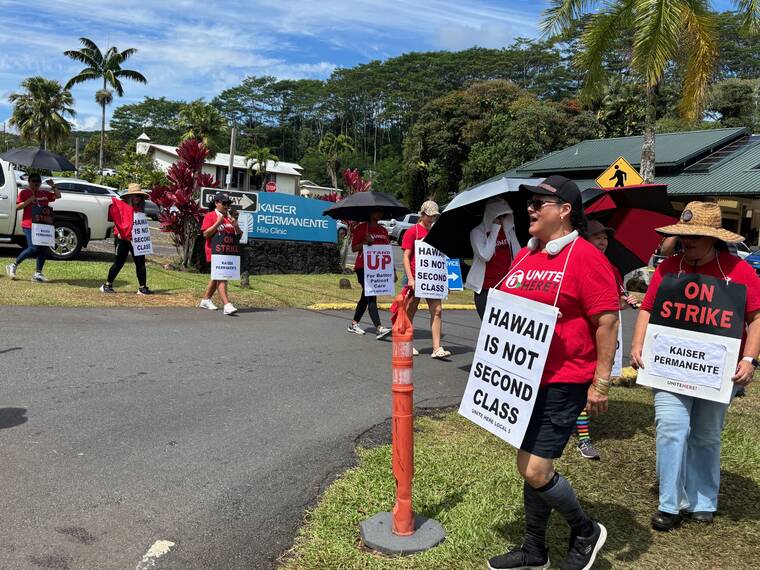Employees at the Kaiser Permanente clinic in Hilo, Hawaii, are entering the third day of a labor strike, demanding better pay and staffing levels. Approximately 15 picketers gathered on Thursday, chanting slogans such as “No contract, no peace!” and “Scabs, go home!” The strike is organized by the Alliance of Health Care Unions, with Hawaii’s Unite Here Local 5 representing over 1,900 workers statewide.
The strike follows the expiration of the existing contract on September 30, 2023. Negotiations have been ongoing since April but have not resulted in a satisfactory agreement. Workers are advocating for improved wages, citing significant disparities between their pay and that of colleagues on the mainland.
Keokilani Keliikuli-Teixeira, an OB/GYN medical assistant with two decades of service at the Hilo clinic, described the situation as “nerve-wracking” and “very concerning.” She highlighted that the picketing efforts are sustained by rotating shifts of about 30 participants daily, from 7:30 a.m. to 5:30 p.m. Tuesday through Sunday. Keliikuli-Teixeira emphasized that wages have not kept up with the rising cost of living in Hawaii, stating, “Our pay increases have not been able to reflect what’s going on in our economy.”
It is anticipated that the current strike, which may conclude on Sunday, October 1, 2023, will not resolve the issues at hand. According to Cade Watanabe, Financial Secretary and Treasurer of Local 5, extending the strike beyond this period would necessitate a new vote from union members and a further ten-day notification to Kaiser.
Watanabe expressed that the strike is not only about wages but also about addressing critical staffing and workload issues. “It’s not just about making sure we get wages that allow us to survive in these very expensive islands,” he said. “We’ve got to make sure that we address the critical issue of staffing and workload.”
The integration of the Kaiser Permanente Hawaii region with its Southern California counterpart has raised concerns among local employees. Keliikuli-Teixeira noted that decisions affecting Hawaii workers are often made by individuals who are geographically distant from their realities. “It’s a lot of number-crunching. We’re not people anymore,” she said.
Carole Abe, a primary care medical assistant at the Hilo clinic for 23 years, echoed Keliikuli-Teixeira’s sentiments, stating that pay is a significant factor in her participation in the strike. Both women balance their professional responsibilities with family obligations, and Abe highlighted the struggles of supporting a household on a tight budget. “It’s unfair. Hawaii’s not second class,” she asserted.
Kanoe Arai, a licensed practical nurse in pediatrics at the Hilo clinic for 10 years, added that the smaller clinic size often requires staff to take on multiple roles, unlike their counterparts on the mainland who have more support. “We do, like, three times as much as them,” she explained.
In a statement issued on Wednesday, Kaiser Permanente reassured its members that essential services would continue during the strike. The statement indicated that the hospital, emergency department, urgent care centers, and most clinics remain operational, and the laboratory and pharmacy departments are prioritizing urgent needs. Kaiser officials expressed gratitude towards employees who continue to support operations during the strike, emphasizing their commitment to providing high-quality care.
As the strike continues, workers remain steadfast in their demands for better working conditions and fair wages, with the future of negotiations still uncertain.






































































